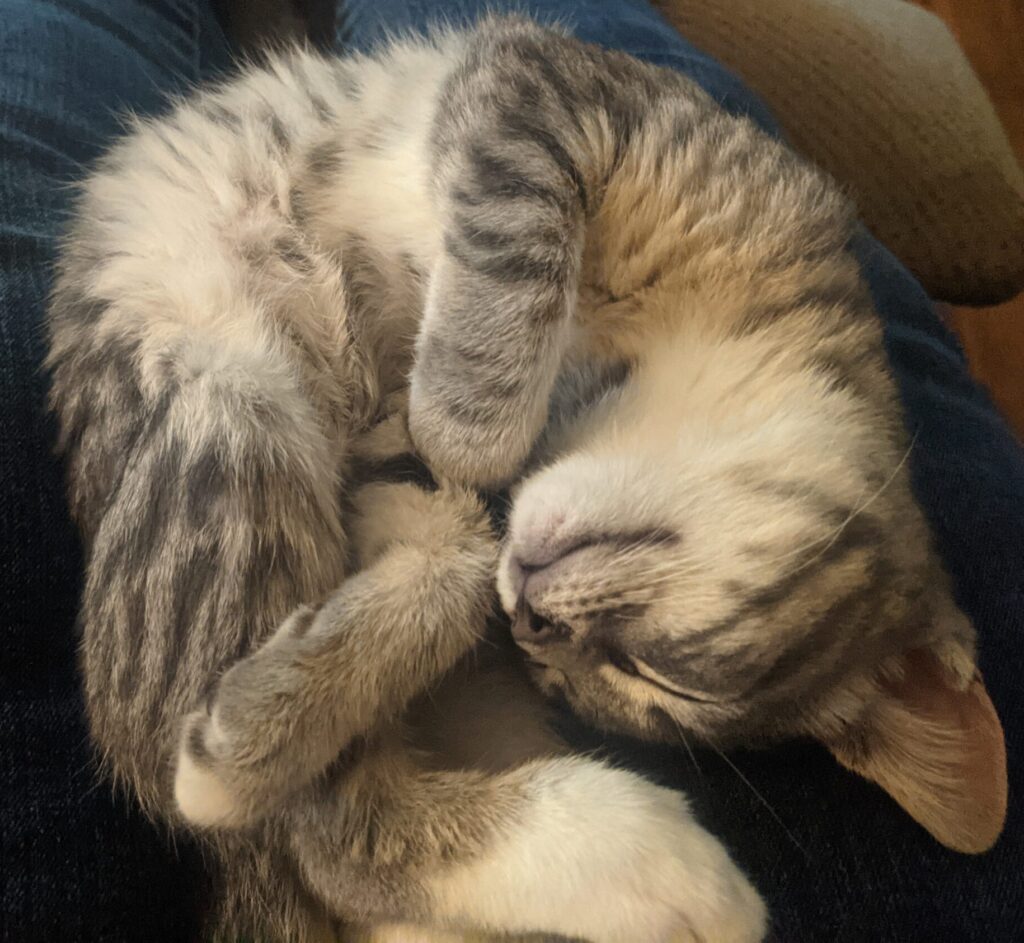
This is one of the few pictures of me that you’ll see on my website or really, anywhere online. The reason? I am overweight. In fact, I’ll come right out and say it: I’m fat. If you’re a fellow fat person, your response is probably more of a shrug than judgment because you know that I didn’t necessarily get here because I’m a lazy overeater. But so many people believe this stereotype, and it is unjustified. There are a lot of factors that go into a person’s weight. The truth is that sometimes I’m physically active, and sometimes I’m not. But I’m one of the most disciplined eaters I know.
I have found this to be true of a lot of overweight people. The next time you visit a restaurant, observe who is eating salad. You may be surprised to find that it is mostly overweight people. I will say that there are some thin people who do have to work to stay thin, and it certainly isn’t my intention to generalize when I’m on a soapbox about generalizing. However, I have met many thin people who allow themselves to splurge when they go out to eat or on special occasions without guilt.
The Science of Getting Fat
Obesity comes from a variety of factors, and we don’t have control over all of them. According to the Centers for Disease Control & Prevention (CDC), weight gain can be precipitated by the following:
- Social factors
- Genetics
- Sleeping patterns
- Health conditions
- Medications
I can personally attest that sleeping patterns and weight gain are correlated. I have dealt with insomnia throughout adulthood, and the problem has only worsened as I became older. While I don’t think it’s the only factor, I do see a correlation between my weight increases and my worsening insomnia.
The CDC reports that a lack of sleep during childhood and adolescence can impair the development of the part of the brain known as the hypothalamus, which regulates appetite and energy expenditure. Even in adulthood, if you don’t get enough sleep, you could experience changes in your metabolism that cause your weight size to increase no matter how carefully you eat.
Hypothyroidism is one of the most common health conditions that can cause weight gain, but I have found that when an overweight person says this, thin people act like it is an excuse for being fat. However, a 2008 study published by the Journal of the American Medical Association found that modest changes in thyroid hormones may be associated with weight gain.
Even If You Are a Lazy Overeater, It Might Not Be Your Fault

I’m the first to admit that there are exceptions to everything. I’m well aware that there are plenty of obese people who overeat and don’t make any effort to exercise. However, even these habits can be at least partly blamed on the same hormonal changes that can lead to obesity. According to Australian government research, the following hormones influence our eating habits, activity levels, and weight:
- Leptin – A hormone that reduces appetite and tells us when to stop eating
- Insulin – A hormone produced by the pancreas that moves sugar from the bloodstream into our cells to be used as energy. In overweight people, the body doesn’t always respond as well to insulin as it should, resulting in higher levels of sugar staying in our bloodstream, a condition known as insulin resistance, which contributes to obesity and diabetes.
- Estrogen and testosterone – sex hormones that control fat distribution in the body, and which decline as we age
Cortisol is another culprit. If you live with excessive stress, you will likely have higher levels of your body’s fight or flight hormone, or cortisol. Cortisol isn’t all bad. We need cortisol for energy. It’s what gives us enough energy to get up in the morning and function during the day. Back in more primitive times, cortisol gave people the energy they needed to run from wild animals that might otherwise have killed them.
The problem happens when we have too much cortisol circulating constantly. When you’re under stress, your body doesn’t know the difference between a physical stressor and psychological stress. The response is the same, which means, you have the energy circulating in your body to run, but you probably aren’t using it for that. As a result, cortisol adds sugar to our blood and fat to our bellies.
The human body doesn’t like change. If you are overweight, and you reduce calories, it’s only a matter of time before your body will reduce your metabolic rate in an attempt to avoid losing more weight. In some cases, reducing calories creates a stress response that increases cortisol, which has also been shown to increase belly fat and stifle weight gain.
Trauma and Weight Gain

According to the Journal of Behavioral Addictions, there is a strong association between adverse life experiences and adult obesity. This has been observed in adults with childhood trauma and trauma in adulthood. This association is especially strong in cases involving post-traumatic stress disorder. According to the studies, binge eating disorder is especially common in people who have experienced such trauma as the following:
- Physical, emotional, and sexual abuse
- Sexual harassment
- Domestic violence
- Bullying
- Severe life-threatening accidents
One study found that sexual abuse during childhood was one of the strongest predictors of adulthood obesity. While researchers have yet to pinpoint the exact causes, it is clear that the causes of obesity are much more complex than a simple lack of self-control.
Exercise Is Hard When You’re Fat

My biggest hurdle is embarrassment. I won’t go to a gym as a fat person. Years ago, I read a letter entitled, “An open letter to the fat person at the gym,” and it was horrible sentiments about how the writer didn’t want his own gym experience ruined by having to look at fat people. There were comments on the letter, and most applauded it and agreed. I wasn’t overweight at the time, but it had a strong impact on me, and to this day, I’m too embarrassed for anyone to see me exercise.
The risk of getting hurt during exercise is also higher when you’re overweight, especially for those who haven’t exercised for a long time. Overweight people stand to get more hurt if they fall, and some have joint problems that make exercise more difficult. Walking is the safest form of exercise, but weightlifting is important to prevent muscle loss. Bodyweight exercises like pushups and pullups are nearly impossible for some overweight people.
Are these excuses to not exercise? No, it’s just another example of the increased challenges overweight people face when trying to move more and eat less.
So What’s My Point?
Those of us who are overweight are much more than slothful pigs who can’t stop feeding our faces. We don’t deserve assumptions that we lack self-discipline, and we certainly don’t deserve laughter at our expense.
Many of us develop a terrible relationship with food because we engage in yo-yo dieting, including very restrictive diets that do more harm than good, and then feel guilty when we finally give in and indulge once in a while.
Our bodies fight us when we try to eat less and move more by reducing our metabolism, shedding muscle, and gaining it all back as fat. What we need is support and acceptance. Overweight people are often beautiful people who struggle in ways you can’t possibly imagine without having gone through it yourself, and none of us deserves to be shamed because of our bodies.
Obesity Is a Health Concern, Not a Barrier to Beauty

Being obese increases the risk of heart disease, diabetes, stroke, and a reduced life span. It is better for our health to be height-and-weight proportional. However, there are also plenty of unhealthy thin people with the same risks, and plenty of healthy fat people. I am overweight, but I live a healthy lifestyle and do not have high blood pressure, diabetes, or high cholesterol. I am losing weight very slowly (painfully slowly) even in the midst of menopause as I attempt to regain my health.
Losing weight should be one of many components of regaining our health. When we address our hormonal issues, trauma, and nutritional deficiencies, that battle becomes easier, and we can see improvements in our overall health. Weight is only one health marker. It is just more outwardly visible than the others. Unfortunately, it is often the last health marker to improve as we work toward better health.
Most people with a lot of weight to lose cannot do it quickly. They need support, acceptance, and unconditional love. If you or someone you care about wants to lose weight, focus first on better health, so you can celebrate all of the health improvements along the way and even enjoy the journey. All of the following are important when reclaiming your health:
- Eating health foods
- Addressing nutritional deficiencies
- Increasing physical activity as much as is practical
- Getting some fresh air when you can
- Reducing and managing stress
- Resolving trauma
- Participate in activities you enjoy
- Spending time with the people you love
You may be happy with your weight, and that’s okay too. There is no rulebook that says everyone has to be a certain weight. If you’ve made peace with your weight, no one has the right to take that away from you. Always remember that beauty is fleeting, and you don’t have to be thin to be beautiful. And never forget that there is more to define a person than their outward appearance.
